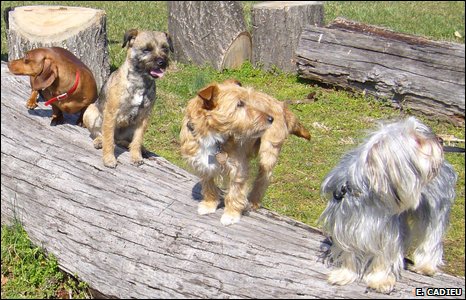Variety of dogs' coats explained By Victoria Gill Science reporter, BBC News
Celtic Oak - Staffordshire Bull terrier - Fila Brasileiro - Cane Corso :: Knightwood Oak :: Santé - Education
Page 1 sur 1
 Variety of dogs' coats explained By Victoria Gill Science reporter, BBC News
Variety of dogs' coats explained By Victoria Gill Science reporter, BBC News

Wiry, smooth, curly or straight - the genetic reason for the the array of coats of different dog breeds is surprisingly simple, say scientists.
Just three genes account for the coat types that make canine pets so diverse. A team of researchers reports in the journal Science that different combinations of these genes account for all of the various textures.
The research could aid the study of the causes of genetic diseases that affect both dogs and humans.
The team was led by Elaine Ostrander from the National Human Genome Research Institute (NHGRI) in Bethesda, US.
She and her colleagues took DNA samples from 1,000 dogs of more than 80 different breeds as well as from a number of wild dogs, including wolves.
These samples gave the scientists access to each dog's genome, which they were able to analyse. They looked for "signposts" of DNA variation, called single nucleotide polymorphisms.
These signal a mutation or change in the DNA code that could account for a particular characteristic.
Edouard Cadieu, a member of Dr Ostrander's research team decided to use this genetic data to study the dogs' coats.
"There are lots of obvious differences between dog breeds," said Dr Ostrander, "but the coats are just remarkable.
"It seems that every breed has a different coat. Some are long, some are short, some are curly, some are bristly, some are smooth, and there is every possible mixture therein."
Dr Cadieu searched for patterns that might reveal the genetic cause of this variety.
Dr Ostrander explained: "For example, for long hair he looked for a commonality in long-haired breeds that's distinct from what we see in short-haired breeds.
"Edouard started out looking at texture - or wiry hair - and quickly found that there was a single gene primarily responsible for that, as well as (for) the moustache and eyebrow pattern that you see in dogs like the schnauzer."
He then moved on to length, and then to curliness. And for each characteristic he identified a single gene that was primarily responsible.
Wild genes
In each case there was an ancestral or "wild-type" form of the gene that dogs inherited from wolves.
There was also a variant or "domesticated form" that had been selected by breeders looking for particular traits like longer hair.
Breeds with more wolf-like coats - such as those with short, straight hair like a beagle - displayed the wild-type version of the gene.
"Just by mixing and matching... these three different genes, we could account for most of the variation that we see in coats in domestic dogs," said Dr Ostrander.
The researchers say that the lessons learned from this study could help in the study of diseases that affect both humans and dogs.
Cathryn Mellersh, a geneticist from the Animal Health Trust in Suffolk, UK said: "This study is important because it proves a principle.
"You can use the dog genome as a model to investigate complex conditions and boil them down to a surprisingly small number of genes."
Dr Ostander concluded: "From a medical point of view, this simplicity is great news."
It means, she said, that the problems of diseases with a genetic basis are "much more solvable".
Dr Ostander also expressed her thanks to all of the dog-owners who donated DNA samples from their pets.
"They've turned out to be extremely helpful, and this data set is just going to keep giving and giving."
Celtic Oak - Staffordshire Bull terrier - Fila Brasileiro - Cane Corso :: Knightwood Oak :: Santé - Education
Page 1 sur 1
Permission de ce forum:
Vous ne pouvez pas répondre aux sujets dans ce forum